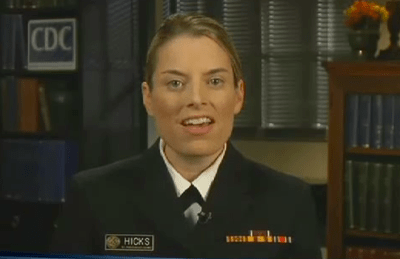Advertisement
Why Not To Demand Antibiotics For Your Post-Christmas Crud

You drag into your doctor's office for help after a week of a ruthless, chest-ripping cough. "Doc, I think it's lung cancer," you say.
"Okay," your doctor says. "I'll write you out a prescription for the chemo drug methotrexate."
Not exactly a realistic scenario, is it? So then why, when you’ve got garden-variety winter phlegm, might you push your doctor to do your bidding and write you an order for antibiotics?
That’s a point paraphrased from a recent talk by Dr. John Powers, a physician and researcher at the George Washington University School of Medicine, and formerly the lead medical officer for antimicrobial drug development and resistance initiatives at the FDA.
I share it now because it's the season of bugs and crud, and chances are you’ve been kissing and hugging a lot of people who were sharing their germs along with their cheer. That means you may soon be tempted to demand a nice little course of a “-cillin” or a “-mycin” from your doctor — but hold on a minute:
Antibiotics remain tremendously valuable treatments when prescribed appropriately for bacterial infections, but the reasons to avoid using them unnecessarily have been multiplying of late, and the information below might tip you a bit toward restraint.
[module align="right" width="half" type="pull-quote"]'Up to about 10% of antibiotic prescriptions can cause some adverse effects.'[/module]
Personally, I just got over a cough so violent that each spasm threw me backward like the recoil of a rifle. Friends told me to get a lung X-ray and to ask for antibiotics, but under the influence of Dr. Powers and others like him, I decided to just wait and see. The message had finally started to penetrate that if an upper respiratory infection is likely to be a virus — and yes, my children had just been through one — time might be the best cure. (It was.)
No question, antibiotics can work wonders. But they’re also hugely over-used, particularly for coughs. A study last month in the journal “Pediatrics” found that American pediatricians order unnecessary antibiotics at least 10 million times a year, for conditions the drugs do not affect such as asthma and flu.

Health authorities say that what doctors and patients alike need to aim for is the sweet spot known as “judicious use” of antibiotics. But where is it? And how do we get there when we tend to focus on the wonder-drug aspects of antibiotics rather than the downsides?
I asked Dr. Ben Kruskal, director of infection control at Harvard Vanguard Medical Associates and director of infectious disease at Atrius Health, who has worked on “judicious use” campaigns both within Harvard Vanguard and as part of a statewide project. (The CDC works on the issue at the federal level; its"Get Smart" materials are here.)
How resistance can affect you
He began with a powerful new reason not to overdo antibiotics, based on research from the last several years: If you take unneeded antibiotics now, it could translate into trouble with other infections later.
That is, you may have heard that when we take antibiotics, our bacteria tends to evolve resistance to them. That resistance is normally presented as a long-term public health problem: “Watch out, if too many of us take antibiotics, the canny bugs could become all but unstoppable.”
But it’s now clear that there are individual consequences for us as well. Our own personal bugs can become more resistant.
“Recent research has shown that for several months after taking antibiotics, the risks of subsequent infections being resistant to that antibiotic — and often to other unrelated antibiotics — are often substantially increased,” Dr. Kruskal said.
Why should we care? I asked him for a scenario.
Let’s say, Dr. Kruskal said, that you have a bad cough and you beg your doctor for antibiotics. You score a prescription for five days of Zithromax. The cough eventually goes away, which it might well have anyway.
A couple of months later, say you get a urinary tract infection, and the germ that you have is now less susceptible to a broad range of the usual antibiotics that would normally be used for that new infection. But your doctor can’t know that, and writes up the usual prescription. You feel better for a couple of days, as the drug suppresses but does not kill the germs; but then you get symptoms again.
Now what might once have been handled over the phone if you’re generally healthy requires an office visit, Dr. Kruskal said. Your urine must be tested, you spend extra days suffering, you may have to pay more out of pocket, and your doctor’s options for treating you may become uncomfortably narrow.
Recalibrating your attitude
Sounds bad. But maybe, I thought, not bad enough to tip a frightened patient or parent. Overall, I told Dr. Kruskal, I think we laypeople have the impression that antibiotics occasionally set off allergies or rashes, but otherwise tend to be effective and have very few downsides. How, I asked, would you correct that?
Using several impressive sets of numbers, Dr. Kruskal did indeed recalibrate my attitude.
To begin with, the overall risk is not as tiny as I’d thought: “The numbers are that up to about 10% of antibiotic prescriptions can cause some adverse effects,” Dr. Kruskal said. “These include minor things like rashes, major things like severe allergic reactions prompting Emergency Room visits, and diarrhea, which can range from mild to severe to life-threatening.”
Then there’s the risk of that individual resistance. Research suggests that in the months after you take antibiotics, the risk approximately doubles that an infection of yours will be resistant to one or more classes of antibiotics.
Now here are numbers that convey a sense of just how massively overused antibiotics are. Among cases of acute bronchitis in otherwise healthy people, Dr. Kruskal said, only about 6 percent are caused by bacteria and even then, most improve about as quickly without antibiotics as with them.
But quality measures of health care consider a medical staff to be A+ material if just 20% of acute bronchitis patients are prescribed antibiotics, he said. And in many practices well over half of acute bronchitis patients get the drugs.

“This culture has evolved over the course of many years,” he said. “I think this is, in a sense, the long-term consequence of the ‘antibiotics as miracle drugs’ image starting in the 1960s. The good news is, this is also susceptible to change.”
Just one more troubling point of particular relevance for parents, this one from Dr. Powers: "Emerging evidence shows that antbiotic use, especially in small children, is associated with an increase in allergic diseases and possibly obesity with its associated risk of diabetes."
The human story
Numbers, of course, can only go so far in changing attitudes. Dr. John Powers acknowledged as much when he spoke recently at a conference on drug-resistant germs held at Boston University.
He shared the story of an otherwise healthy young woman who had a persistent cold, was prescribed antibiotics and was hit by a violent reaction that made her skin slough off. She died.
“Is this common? No,” he said. “But this is completely preventable because this person didn’t need an antibiotic to begin with.”
I tend to block out the memory, but my late mother had a similar reaction to the drug Bactrim, prescribed for a urinary tract infection. Already in a coma after a car accident, she spent days in a burn unit where the heroic staff painstakingly treated her peeling skin. Of all our tear-drenched months after her accident, that was the low point.
What’s the worst thing that could happen?
And yet, and yet — so often antibiotics do no harm and work. What, I asked Dr. Kruskal, should be our rule of thumb about when to push a little harder to get them?
“I think pushing for antibiotics is probably almost never necessary,” he said. “Doctors are already overprescribing such that I think there are very few circumstances when a patient should get an antibiotic and isn’t offered it.”
When, then, should we push back against antibiotics?
“I wouldn’t say ‘pushing back’ as much as ‘not demanding,’” he said. “And if a doctor offers an antibiotic in a way that the patient doesn’t clearly understand, the patient should ask: ‘What’s likely to happen? And what’s the worst thing that could happen if I don’t take this?’ ”
Test your own knowledge on antibiotic use at the CDC’s”Get Smart” Website here and see their wisdom on other ways to relieve symptoms here. Personal note: Hot baths!
This program aired on December 23, 2011. The audio for this program is not available.
